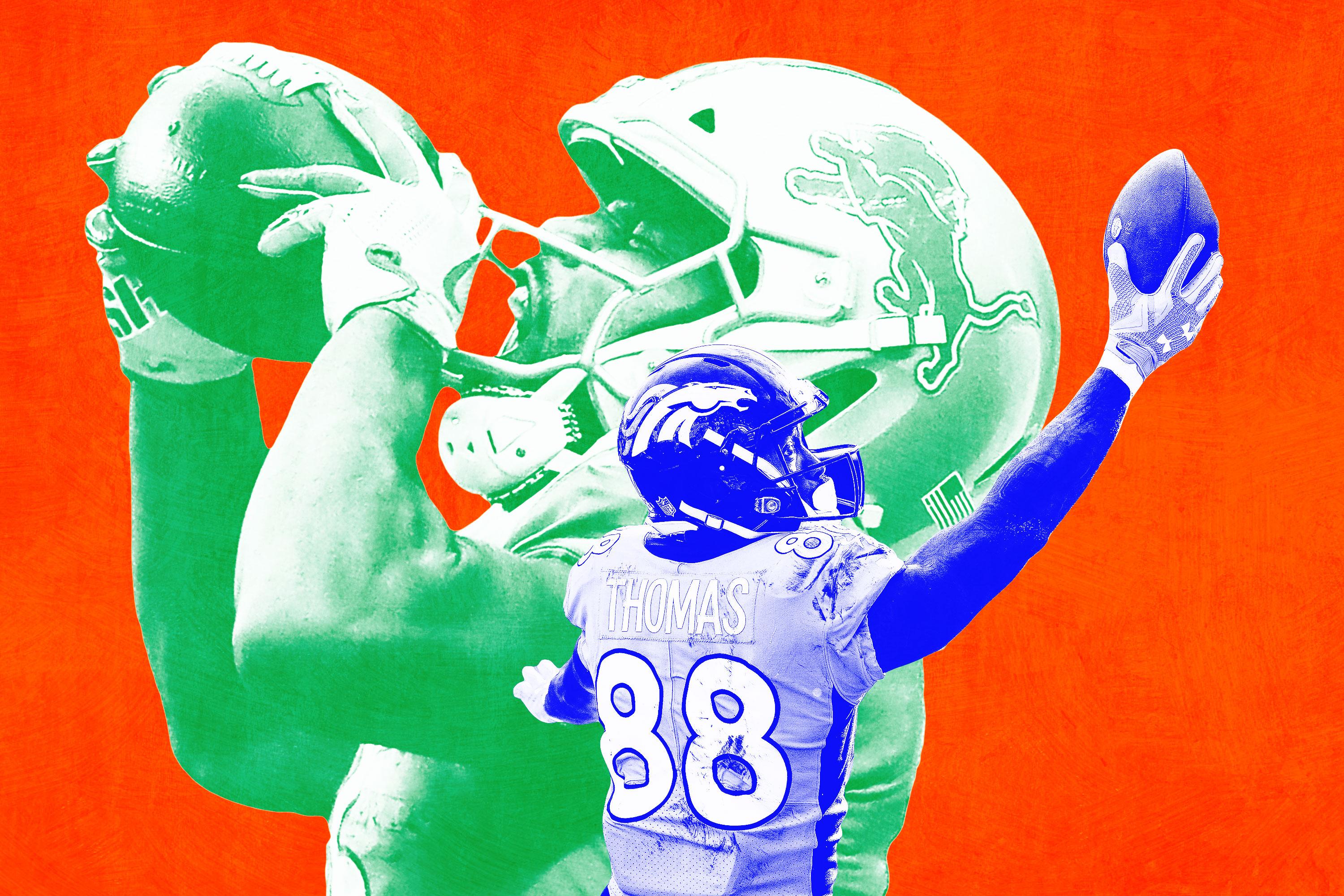
Once a typically uneventful blip on the NFL calendar, the trade deadline has transformed into one of the most exciting days of the season. Due to a variety of factors―the exploding cap, the rookie wage scale, and a growing culture of aggressiveness among team decision-makers―trades have become a more important part of roster construction than ever before. In the past couple of weeks, a handful of teams got a head start on the action, with the Browns sending running back Carlos Hyde to Jacksonville, the Cowboys dealing for Amari Cooper, the Lions trading for defensive tackle Damon Harrison, and the Saints landing cornerback Eli Apple. On Tuesday a flurry of additional deals went down: The Texans sent Denver a fourth-rounder for receiver Demaryius Thomas, the Eagles gave up a third-rounder for Golden Tate, the Ravens surrendered a future seventh-rounder for Ty Montgomery, the Redskins acquired safety Ha Ha Clinton-Dix, and the Rams traded for former first-rounder Dante Fowler Jr.
There’s a lot to digest, but let’s take stock of some of the early winners and losers from the NFL trade deadline.
Winner: Teams Looking to Off-load Lame Duck Receivers
If there’s one pattern that emerged at the trade deadline, it’s that teams looking to move late-contract receivers found a surprisingly strong market.
Take the Broncos, who somehow convinced the suddenly receiver-needy Texans to give up a fourth-round pick for veteran pass-catcher Demaryius Thomas, a player they’d likely planned to release after this season. Now that choice falls to Houston, who surrendered that midround draft capital in exchange for what likely amounts to a short-term rental. The 6-foot-3, 229-pound receiver does provide some much-needed depth and experience over the team’s stretch run — something they’re in dire need of after losing Will Fuller V to an ACL tear — but it’s doubtful Thomas is a part of Houston’s long-term plans. The 31-year-old receiver will head into 2019 in the final year of a five-year, $70 million deal that has a $14 million cap hit — a big chunk of change for a player whose speed and production have deteriorated over the past few years.
The 3–4 Cowboys found themselves in a similar boat as Houston, badly in need of an upgrade at their paper-thin receiver position if they were going to make a run at the relatively wide-open NFC East. Jon Gruden exploited that situation, somehow finagling a 2019 first-round pick out of Jerry and Stephen Jones for embattled pass-catcher Cooper. While talented, the highly inconsistent 24-year-old had a questionable-at-best future with the rebuilding Raiders. Oakland faced a big choice: Cut bait at the end of the year and get nothing, or hold on to Cooper into 2019, guaranteeing his fifth-year option salary of $13.9 million — again, a huge amount of money for a player who has recorded 10 or fewer receiving yards in three separate games this year already. Now that’s a decision the Cowboys must make.
The Lions’ decision to off-load Golden Tate follows a similar tack. Sure, Detroit’s still technically in contention in the NFC North at 3–4, and Tate’s dynamic yards-after-the-catch talent certainly would’ve helped their offense down the stretch. But Detroit was also keenly aware that the 30-year-old Tate’s deal is up at the end of the year; so, instead of letting him hit the open market and taking their chances on the compensatory pick formula (which depends on the players the team signs in free agency), Detroit got a guaranteed third-round pick out of the defending champion Eagles, who clearly felt they needed help to get back over the hump in the second half. Hell, Detroit could even re-sign Tate once he becomes a free agent after the season.
Winner: Carson Wentz
Philly’s obviously not nearly as talented or deep on defense as it was during its Super Bowl run last year, but adding Tate to an offense that has started to hit its stride over the past few weeks makes this team look pretty damn dangerous down the stretch.
Wentz has got himself quite the arsenal from which to work: He has an elite tight end and de facto no. 1 in Zach Ertz; a big, physical outside pass-catcher and red zone threat in Alshon Jeffery, who’s playing better than ever after recovering from offseason shoulder surgery; a pair of experienced pass-catchers in Jordan Matthews and Nelson Agholor; and a versatile running backs group with Wendell Smallwood, Corey Clement, Josh Adams, and Darren Sproles. Add Tate, and the sky’s the limit for this offense. Tate could operate out of the slot, play on the outside, or even take snaps in the backfield as a running back. He is one of the league’s most dangerous runners in the open field and there’s little doubt head coach and play-caller Doug Pederson will have a good plan for how to get the ball in his new playmaker’s hands in space. It’s hard to imagine how defenses are going to match up with an offense with that many weapons — and a quarterback who can make plays with his feet.
Loser: Nelson Agholor
After a move to the slot helped Agholor break out for the Eagles last year, the fourth-year pro may see his role diminished — or altered — because of Tate’s arrival. Tate has lined up in the slot on 70 percent of his routes this year, per Pro Football Focus, which could bump Agholor (61 percent slot rate) to the outside, where he’s been less comfortable and less effective, or off the field entirely. Tate is more dynamic than Agholor, and will likely steal a big piece of the offensive pie.
Winner: The Concept of Going All In
At 8–0, the Rams didn’t exactly need to make that proverbial “put them over the top” move at the trade deadline. They’re already the elite team in the NFC, and have an offense that looks capable of carrying them to the Super Bowl. But after spending the entire offseason wheeling and dealing to stack their roster, why the hell should they stop now?
The trade for Fowler does address a weak spot on the defense―the edge rush―and it wouldn’t be a huge shock for longtime defensive genius Wade Phillips to unlock the disappointing former third overall pick’s mostly unrealized potential. Playing next to Aaron Donald and Ndamukong Suh certainly won’t hurt, and like many of the team’s other “all-in” rentals, if he plays well, he’ll have the chance to earn a long-term extension.
Winner: Deshaun Watson
It was pretty clear the Texans needed to boost its dangerously thin receiver spot. With Fuller out for the year because of a torn ACL, and rookie playmaker Keke Coutee still nursing a nagging hamstring injury, Watson was left with the prospect of throwing to DeAndre Hopkins … and basically no one else, unless you’re counting on guys like Sammie Coates and rookie Vyncint Smith picking up the slack.
Thomas is no longer the player he once was, but he’s still got plenty of size and is experienced enough to help give Watson a new, more dependable target in the short and intermediate areas of the field, on third downs, and in the red zone. Teams are going to continue to double- and triple-team the hell out of Hopkins, but now Watson has a secondary option with a big catch radius to throw to until Coutee can get back onto the field.
Winner: Courtland Sutton
The rookie pass-catcher out of SMU had already flashed in the first half of the year as the Broncos’ no. 3 option, but now should get a big boost in opportunities after Thomas’s departure. Sutton, who has averaged 19.1 yards per reception this year (trailing only DeSean Jackson [22.8] and Tyrell Williams [21.4]) as primarily an outside deep threat for quarterback Case Keenum, should see his role, and route tree, evolve.
Winner: Nick Chubb
The Browns signed former 49ers running back Carlos Hyde to a three-year, $15 million deal over the offseason ostensibly to make him the team’s feature back, but then threw that assumed plan for a loop by drafting Georgia’s Chubb with the 35th overall selection. And while Hyde opened the year as the team’s undisputed bell cow, outcarrying Chubb 114 to 16 in the team’s first six games, Chubb flashed elite potential the few times he did get onto the field, breaking off a handful of chunk runs (he averaged 10.8 yards per carry and scored twice) in his minor role. Those glimpses were apparently enough to convince Cleveland GM John Dorsey to ship Hyde to Jacksonville for a fifth-round pick and hand the keys to the run game to his explosive rookie back.
Chubb is now the unquestioned backbone of the team’s ground game. He’s logged 36 of the team’s 39 running back carries in the past two games, rushing for 145 yards (4.03 average) and a touchdown. As expected, his yards-per-carry average has dropped off since inheriting the lead role, but Chubb’s still proving he’s one of best tackle-breaking backs in the league. Among runners with at least 50 carries, he leads the league in PFF’s elusive rating and yards after contact per carry. His future is bright.
Loser: Carlos Hyde
For starters, Hyde goes from a dysfunctional organization in Cleveland to a team teetering on the edge of becoming one in Jacksonville. Making matters worse, he’s likely to play a more limited role in his new digs. Hyde, who sat out his first game after being traded and got just six carries in his second game, now faces the potential of splitting carries with Leonard Fournette, who’s expected back from a lingering hamstring injury after the bye.
Winner: Dak Prescott
Cooper is clearly not the perfect trade target, but he gives the Cowboys something they’re desperately short on this year: pass-catching talent. When the unpredictable former Raider is on, he’s an excellent route runner who can create separation underneath and get behind a defense with his best route, the sluggo — or “slant and go.”
That big-play element should benefit Prescott, whose de facto no. 1 target before the trade vacillated between rookie Michael Gallup, veteran journeymen Allen Hurns and Deonte Thompson, and slot receiver Cole Beasley. With Cooper set to take over as the team’s go-to guy, Prescott’s complementary pass-catchers can return to roles they’re more suited for: Gallup as a dangerous deep threat, Hurns and Thompson as the team’s no. 2 types, Beasley as a clutch third-down conversion-maker, and Tavon Austin as a gadget player.
Loser: Amari Cooper
Of course, everything’s relative. With the Cowboys giving up a first-round pick to acquire Cooper, fans are going to have unreasonably high expectations for what the former Raider can bring to the team’s offense. Cooper still has the talent to regain the form we saw early in his career, but he’s coming into a passing offense that’s had its fair share of issues the past two years, from a far too basic, archaic passing scheme to Prescott’s problems with accuracy and decision-making. In other words, Cooper’s unlikely to be a miracle worker in this scheme: He could play better than he did the last two years in Oakland and moderately improve the team’s passing attack … and still end up looking like a waste of a first-rounder.
Winner: Dennis Allen
In the season’s early going, the Saints defensive secondary — a major strength for the team last year — had quickly become a weakness. Marshon Lattimore hit the dreaded sophomore slump; free agent acquisition Patrick Robinson broke his ankle, forcing backup slot corner P.J. Williams into a bigger role; and Ken Crawley was an exploitable weak link, giving up four touchdowns with no picks in six games while surrendering an opposing quarterback passer rating (154.8) that bordered on “perfect” per PFF.
New Orleans defensive coordinator Dennis Allen badly needed some reinforcements if he had any shot of recreating last season’s secondary magic, and he got a little bit of help with the trade for Giants cornerback Eli Apple. The former first-rounder had worn out his welcome in New York, but he’s got the talent to upgrade the Saints’ no. 2 cornerback spot opposite his former college teammate Lattimore. That alone could stabilize the scheme and help New Orleans regroup on defense.
Loser: Mickey Loomis
Of course, Apple wasn’t free. The Saints gave up a 2019 fourth-round pick and a 2020 seventh-round pick for the 23-year-old cornerback, further curtailing the team’s draft capital this year. New Orleans general manager Mickey Loomis now has just six picks at his disposal (before compensatory picks are announced), and only one of them — the team’s second-round pick — has any major value.
Past that, Loomis is looking at Day 3 as his only avenue toward building future depth and is currently set to pick with a fifth-rounder, two sixth-rounders, and two seventh-rounders. New Orleans is going to have to make some moves to recoup some of the draft capital it’s lost in trading up for Marcus Davenport and dealing for Teddy Bridgewater and Apple.
Winner: Brian Gutekunst
Packers GM Brian Gutekunst used the trade deadline to make his team a little bit richer come draft weekend. In addition to the team’s native picks, Green Bay came into this week already owning New Orlean’s first rounder (Davenport) and Seattle’s sixth (Brett Hundley). With the deal that sends Ha Ha Clinton-Dix — a safety whom Green Bay had no plans to extend after this year — to Washington, Gutekunst picked up an additional fourth-round pick then grabbed another 2020 seventh-rounder to offload embattled running back Ty Montgomery.
Loser: Mike Pettine
In the short term, though, Packers defensive coordinator Mike Pettine is going to have to figure out how to replace a guy who’s made 65 starts for this team over the past five seasons. The proverbial “next man up” is Jermaine Whitehead, and this could be a big opportunity for second-year pro Josh Jones to grab a bigger role. We’ll see how it all plays out, but the Packers defense is now really thin on experience at the safety position.

